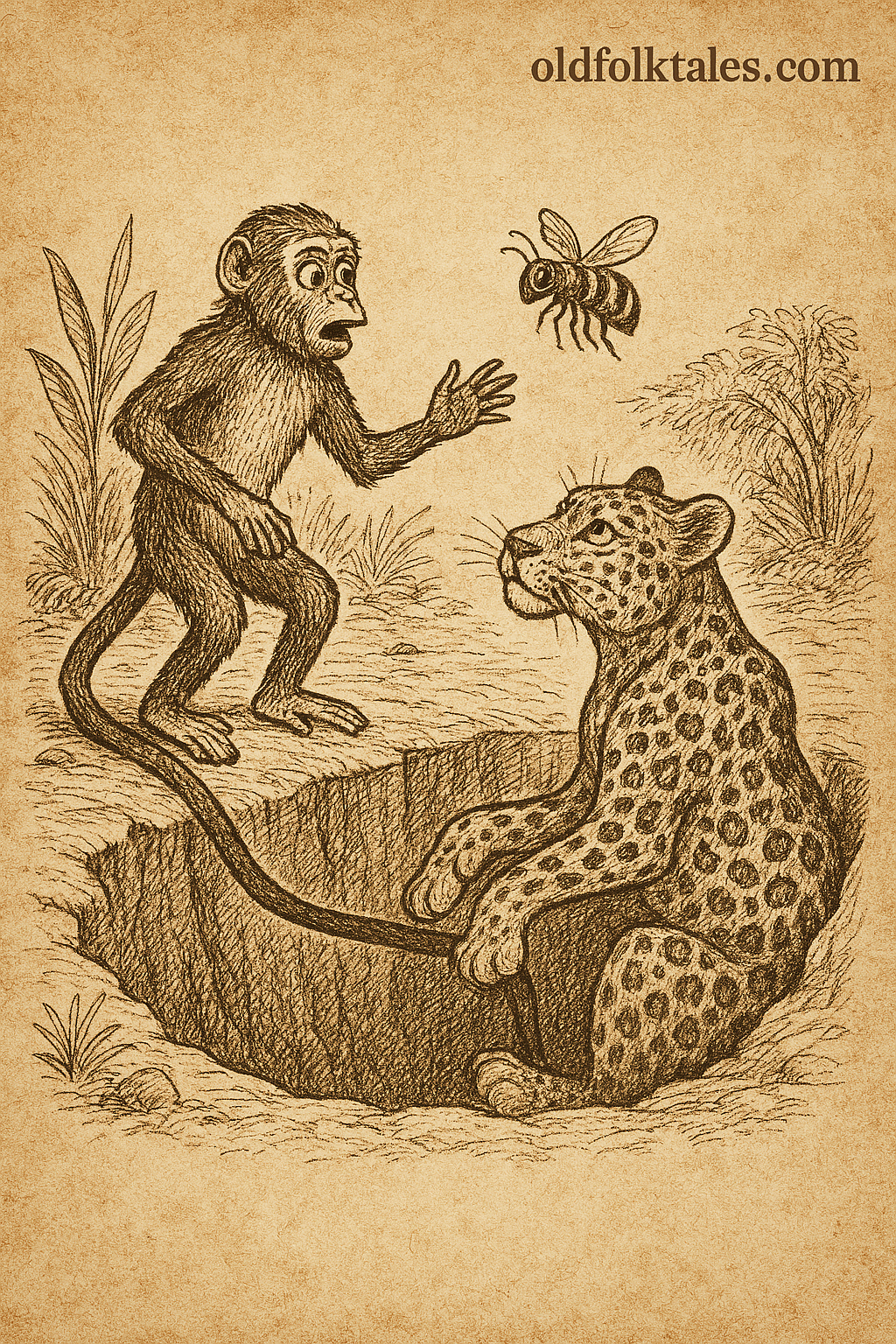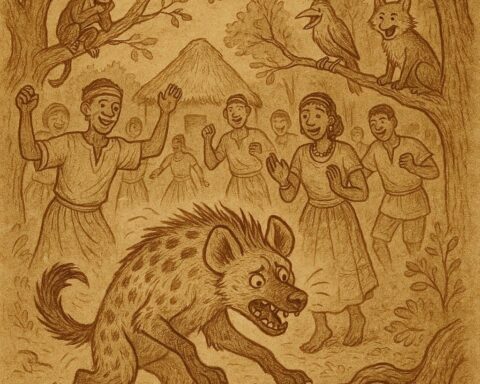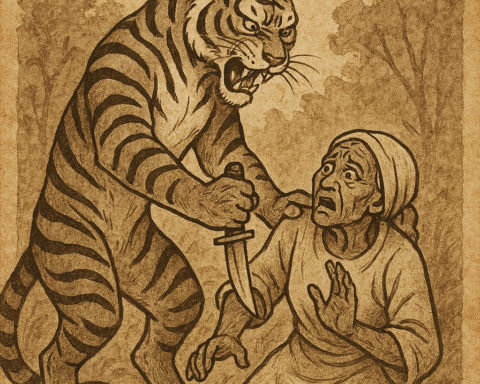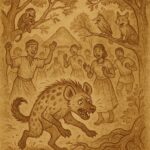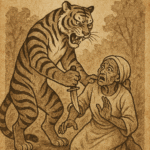In a verdant land far beyond the horizon, where the earth breathed life into countless crops and the seasons danced in perfect harmony with human toil, there lived a community of farmers whose prosperity was matched only by their wisdom in reading the rhythms of nature. These skilled cultivators grew an abundance that would make any village envious, plantains that hung heavy on their stalks, cocoyams that swelled fat beneath the soil, golden bananas that sweetened in the tropical sun, and yams that grew as large as a child’s head.
Their fields stretched across fertile valleys, nurturing cassava roots that could feed families for months, maize that stood tall like golden soldiers, pumpkins that rolled round and orange across the ground, and njankah, both the sweet varieties that children craved and the bitter ones that added depth to their evening stews. At home, their compounds buzzed with life as sheep bleated contentedly, goats climbed and played with characteristic mischief, pigs wallowed in comfortable mud, and fowl pecked and strutted with importance.
The young children, too small yet for the demanding work of the farms, spent their days as faithful guardians of these precious animals, learning responsibility while their parents labored under the generous sun. The earth was indeed their sun, shining during the day and breathing life into every seed they planted. The earth was their moon, glowing bright at night as they gathered their children under the spreading branches of ancient cotton trees to share stories and wisdom passed down through countless generations.
Also read: Why Bees Sting Those Who Judge Others
But for all their agricultural mastery and abundant harvests, so plentiful they could never consume all they had stored before the next season’s bounty arrived, these farmers faced one persistent and heartbreaking problem. Their animals, no matter how carefully tended during the day, rarely lived to reach full maturity.
The reason for this tragedy prowled through the neighboring woods on silent, padded feet. Countless ngwaba leopards with spotted coats and eyes that gleamed like amber in the darkness, emerged from their forest domain when night fell. These powerful predators roamed boldly through the village streets, killing and devouring the farmers’ precious livestock with ruthless efficiency.
Though the villagers possessed extraordinary knowledge of soil and seasons, though they could read moisture in clouds and know precisely when to plant their seeds, though they understood exactly when to weed their crops for optimal flowering, they were sadly a people without hunting skills. They had learned through generations of experience to leave the forest to its own mysterious devices when darkness descended, and the ngwaba had learned to stalk the night and pay their village these devastating, unwanted visits.
After seasons of mounting losses, the desperate farmers convened a solemn meeting and decided to seek help from their neighbors, a village renowned for men who were as skilled at hunting as they themselves were at farming. As the Beba people say, the chosen emissaries gathered their belongings and departed as dusk painted the sky in shades of purple and gold.
When they reported their dire predicament to the hunters, these experienced men listened with growing concern and agreed immediately to track down the marauding leopards. They would claim all the leopards they killed as fair payment for their dangerous assistance.
But these leopards proved to be cunning adversaries beyond the hunters’ experience. Night after night, the skilled marksmen employed every technique they knew, yet failed to kill a single ngwaba. These leopards behaved with an almost supernatural intelligence, standing boldly in the direct line of fire and staring fearlessly at the hunters. But the moment the men squeezed their triggers and the double-barrel guns erupted in flame and smoke, the leopards seemed to know exactly when to vanish like shadows into the darkness.
It appeared they were determined to prove the old saying that only the owner of a mad dog truly knows how to catch it. Frustrated and tired of wasting precious gunpowder on these ghostly targets, the hunters decided to change their tactics entirely. They would rely on traps instead of bullets.
Working through several moonlit nights, they selected eight strategic locations around the village perimeter and dug deep pits with steep walls that would be impossible to climb. With meticulous care, they covered each pit with a delicate lattice of dry twigs and grass that would support a small animal but collapse under the weight of a leopard.
Days and nights passed in tense anticipation, while the leopards continued their forest foraging as was their ancient habit. Gradually, they began to wonder why the humans had suddenly abandoned their hunting efforts and left the forest undisturbed. As days faded into nights and suspicion grew in their keen minds, the ngwaba convened their own meeting and agreed unanimously not to venture into the village until they could determine what new strategy the humans had devised.
But hunger, as it often does, eventually overcame caution. One day, when the sun hung high and bright, a time when leopards typically rested in cool shadowsa , particularly famished ngwaba ventured out in broad daylight to search for food. His stomach growled with desperate need as he wandered through bushes near the cornfields, when suddenly his predator’s eyes caught sight of a mbiandeb, a fat, hairy rat mole that ran with an awkward, clumsy gait.
Instinct took over as Leopard shot forward in pursuit of this easy prey. But the clever rat mole quickly disappeared down a narrow hole, and in his blind determination to catch his meal, Leopard failed to notice one of the carefully concealed pit traps. With a thunderous crash that echoed through the forest, puum!, he plummeted straight down, his back hitting the bottom of the deep pit with bone-jarring force.
He clawed desperately at the earthen walls, but his powerful paws could find no purchase on the smooth sides. There the mighty predator languished for two long days and two endless nights, growing weaker as hunger gnawed at his belly and desperation clouded his usually sharp mind.
On the third day, hope appeared in the most unexpected form. Above his head, Nkierr-the-Monkey came swinging cheerfully from branch to branch, his carefree movements a stark contrast to Leopard’s dire predicament. The trapped ngwaba was beside himself with relief and immediately called out in his most persuasive voice.
“My dear friend,” he pleaded with carefully calculated charm, “please help me! Look down and see my desperate situation. I am trapped in this godforsaken human pit, and I beg you to help me escape before those hunters return to inspect their traps. I have been suffering here for two full days, and I am starving to death.”
Monkey paused in his swinging and looked down skeptically. “I know your reputation well, Leopard. If I help you escape, you will surely eat me the moment you are free.”
“Come now, my friend,” Leopard replied with wounded sincerity. “Why would I ever consider eating you? I would never dare commit such an ungrateful act, especially not after you have saved my very life. You know that rivers only fill with water from the rain gutter, help flows from help. Please, I implore you, don’t leave me here to die a slow and miserable death.”
Monkey harvested several leaves and chewed them thoughtfully, weighing Leopard’s desperate request with careful consideration. His instincts screamed warnings: “I don’t trust him. You can never trust a leopard, especially not a hungry one.” He plucked another leaf and chewed it slowly, studying the predator below.
Leopard’s eyes had grown red and weak from hunger and exhaustion, his breathing labored and shallow. Monkey could see it was only a matter of time before the mighty ngwaba would join his ancestors in the spirit realm. Despite all his reservations and the wisdom that told him to flee, he felt genuine pity for the suffering creature. Something in Leopard’s voice convinced him of the predator’s sincere gratitude.
Against his better judgment, Monkey swung from branch to branch down the tree until he reached the edge of the treacherous pit. With careful precision, he dangled his long, strong tail into the hole. Leopard grasped it firmly, planted his powerful hind legs against the pit wall, and slowly maneuvered himself up and out of his earthen prison.
But the moment he breathed fresh air and felt solid ground beneath his paws, the ungrateful predator clamped his sharp teeth shut on Monkey’s tail with vicious determination.
“I will eat you,” he declared with cold finality.
Shock and betrayal flooded through Monkey as he stared at his captor. “Didn’t you promise faithfully not to eat me?”
“You must understand that a hungry man cannot listen to reason,” Leopard replied with heartless logic. “I have no choice but to eat you.”
“But you gave me your solemn word!”
“I did indeed swear not to eat you, but surely you understand that I am desperately hungry, so I simply must consume you,” Leopard explained as if his betrayal were perfectly reasonable.
“But surely you know the law that governs such matters?”
“What law?” Leopard asked, still gripping Monkey’s tail firmly between his deadly teeth.
Monkey’s mind raced with the desperation of the doomed. “You know the ancient law of our land that clearly states you must pray before eating a monkey, or else maggots will devour your intestines from within.”
Leopard paused, his stomach growling and his bowels rumbling with hunger, as he tried to recall this supposed law. He couldn’t remember any such regulation, and he even doubted such a law existed. But determined not to risk losing his free meal to some forgotten taboo, he reluctantly released Monkey’s tail, closed his eyes tightly, and began to offer what he hoped would be a sufficiently respectful prayer.
As the Beba people wisely say, Monkey asked his legs whether he had ever eaten a meal without sharing the benefit with them, and they responded with unanimous loyalty, “Never!” With one powerful, explosive push, his legs propelled him up and up and up until he flew like a bird to the safety of the treetop.
When Leopard finished his prayer and opened his expectant eyes, he found himself completely alone. Looking upward, he saw Monkey sitting securely on a high branch, wagging his tail in mocking defiance. The leopard’s fury at his own foolishness was so intense that he jumped and stomped on the ground like a spoiled child throwing a tantrum.
“I should never have trusted you!” he moaned, digging his claws into the earth in frustration. Monkey’s laughter only made him stomp harder, and in his blind rage, his thrashing hind legs struck a stick lying across the mouth of the pit. He lost his balance completely and, puum!, tumbled right back into his earthen prison.
High above in the tree, Monkey observed Leopard’s ridiculous antics, laughing so hard he slapped his sides with glee.
“You were absolutely right, my friend,” Monkey called down with delicious irony. “It is indeed the fly that makes feces popular!”
Monkey’s infectious laughter drew the attention of Akwoghnjob-the-Cow, who was peacefully grazing on the hillside nearby. She chewed thoughtfully on fresh grass and trotted over to investigate the source of such merriment.
“What has gotten into you today, little one?” she asked, looking up at the jubilant Monkey.
“Hi hi hi, what can I say?” Monkey replied, still wiping tears of laughter from his eyes.
“Something extraordinary must have happened to make you this ebullient.”
“You will never believe me if I tell you the complete truth.”
“Look here, my little nkierr,” Cow said with dignity, “do I appear to be someone born yesterday? Does the gray of my hooves look like the color of those innocent clouds above?”
“Very well, I’ll tell you exactly what occurred… but only on one condition.”
“And what might that be?”
“You must promise solemnly not to laugh.”
“Out with your story, you little rascal.”
And so Monkey recounted his incredible encounter with the ungrateful Leopard, describing in vivid detail how the predator had attempted to devour him immediately after being rescued. To Monkey’s amazement, Cow began mooing with such uncontrollable mirth that her hooves stomped the earth rhythmically, attracting the attention of other animals throughout the area.
“But you promised you wouldn’t laugh!” Monkey protested.
“Yes, I did make that promise. But you don’t actually expect me to believe such an outrageous tale, do you?”
“What exactly do you mean?”
“I mean… you seriously want me to believe that someone as puny as you helped that massive Leopard escape from this pit?”
“I swear on my ancestors that I did exactly as I have told you.”
Cow approached the edge of the pit, stared directly at the trapped Leopard, looked up at Monkey, and declared, “Is this the ngwaba you claim to have rescued?”
Monkey swung confidently to the ground, walked to the pit’s edge, peered inside, and nodded vigorously at Cow.
“You really take me for a complete fool, don’t you? You expect me to believe that someone as tiny as you assisted someone as enormous as him out of that deep hole? If it’s genuinely true that you accomplished this feat, I demand to see you do it again,” Cow sneered with obvious disbelief.
Leopard, momentarily forgetting his hunger while listening to this conversation above his head, found a bemused smile dancing on his lips. Monkey hesitated, but it was the kind of hesitation born of wounded pride rather than wisdom. His small chest swelled with determination to prove that strength wasn’t always about size.
Monkey planted himself firmly on the ground and lowered his tail into the pit once again. Leopard eagerly grasped it, quickly dug his claws into the earthen wall for leverage, and crawled out of his prison. But no sooner was he free than he immediately sank his teeth into Monkey’s hindquarters.
“Leopard, what are you doing?” Monkey cried in pain and disbelief.
“I am desperately hungry. I haven’t eaten in two days, and now I absolutely must devour you…”
But before he could bite into Monkey’s flesh, Cow burst into even louder laughter than before. Her mooing echoed across the hillside, and both Leopard and Monkey stared at her in complete bewilderment.
“Is something wrong with you?” Leopard demanded, maintaining his grip on Monkey’s posterior with his right paw.
“I cannot believe what I am witnessing with my own eyes,” Cow declared between fits of laughter. “Is it truly possible that such a little creature as Monkey can pull you out of that hole?”
“You saw it happen with your own eyes,” Leopard retorted indignantly.
“No, no. I need to witness this miraculous feat one more time so that when I tell the other animals, I can be certain my eyes didn’t deceive me initially.”
“What? You want me to climb back into that pit?”
“Absolutely.”
“Look here, I haven’t eaten anything in two full days, and I desperately need to consume this monkey.”
“Then you’d better hurry with this demonstration. The sooner you’re down in the pit, the sooner you’re back out, the sooner you can eat your meal, and the sooner I can be on my way to share this incredible story.”
“Fine,” Leopard growled in exasperation, and jumped back into the pit.
To his complete shock and dismay, Cow immediately fell on her hindquarters, raised her front legs high in the air, and laughed with such hysterical abandon that her entire body shook. When Leopard looked around frantically for his intended meal, Monkey was nowhere to be found.
From his safe perch high in the treetop, Monkey pointed down at the twice-trapped predator and declared with righteous satisfaction, “One good turn deserves another, you fool! Where in all the world have you ever heard of a child who slaps his mother or bites the very breast that feeds him? You shall end up in a hunter’s pot today, and you have earned every bit of your fate!”
With that final pronouncement of justice, Monkey swung away from branch to branch, leaving the foolish Leopard to face the consequences of his ungrateful betrayal.
The Moral Lesson
This powerful tale teaches us that ingratitude and betrayal inevitably lead to self-destruction. When we repay kindness with cruelty, we not only damage our relationships but often trap ourselves in situations worse than our original predicament. The story reminds us that true wisdom lies in honoring our promises and treating our benefactors with genuine gratitude, for those who bite the hand that feeds them will find themselves hungry and alone.
Knowledge Check
Q1: Who is the ngwaba in this Beba folktale and what problem did he cause? A1: The ngwaba is the Leopard, a spotted predator who, along with other leopards, terrorized farming villages by killing their livestock at night. Despite the farmers’ prosperity in growing crops and raising animals, the leopards prevented their animals from reaching maturity through these nighttime raids.
Q2: What hunting methods did the neighboring village hunters use against the leopards? A2: The hunters first tried using double-barrel guns, but the intelligent leopards seemed to know exactly when to disappear from the line of fire. When gunpowder proved wasteful, the hunters changed tactics and dug eight deep pit traps around the village, carefully covering them with dry twigs and grass.
Q3: How does Monkey first help Leopard, and what does this reveal about his character? A3: Despite knowing Leopard’s dangerous nature, Monkey feels pity for the starving, trapped predator and uses his tail to help him escape from the pit. This reveals Monkey’s compassionate nature and willingness to show mercy, even to natural enemies, when they are suffering.
Q4: What clever trick does Monkey use to escape Leopard’s betrayal? A4: Monkey invents a fake “law” claiming that anyone who eats a monkey must first pray or else “maggots will eat your intestines” (a Beba expression meaning chronic diarrhea). While the gullible Leopard closes his eyes to pray, Monkey uses his powerful legs to leap to safety in the treetop.
Q5: How does Cow contribute to Leopard’s final downfall in the story? A5: Cow pretends not to believe Monkey’s story about rescuing Leopard and demands to see a demonstration. Her skepticism tricks both Monkey and Leopard into repeating the rescue scenario, but this time she deliberately abandons Leopard in the pit after Monkey escapes, ensuring the ungrateful predator faces the hunters’ justice.
Q6: What does the Beba saying “it is the fly that makes feces popular” mean in the story’s context? A6: This proverb means that troublemakers attract negative attention to situations that might otherwise be ignored. In the story, it refers to how Leopard’s own foolish actions and betrayals have made his predicament worse and drawn unwanted attention, leading to his ultimate capture and punishment.
